Leaders of the religious right misleadingly paraphrase the First Amendment. They claim it assures some unbounded “freedom of religion.” It does not. As we all know, the text reads:
“Congress shall make no law respecting an establishment of religion, or prohibiting the free exercise thereof.”
For convenience, analysts separate “the establishment clause” from the “free exercise clause.” The clear, self-limiting opposition of the two clauses uses freedom to prevent establishment, but it does not thereby allow just any freedom.
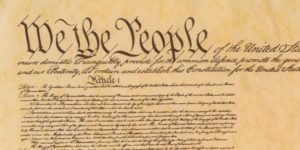
Two examples of the right’s exaggerated claims occur in the Hobby Lobby and the Masterpiece Bakeshop cases. Both of these rely on a 1993 act of Congress, the Religious Freedom Restoration Act (RFRA) which, by its very name, shortened “no infringement of free exercise” to “religious freedom.” RFRA begins with a strong defense of religion. Even laws claiming to be neutral toward religion, it says, may indeed burden free religious exercise. Its exact words are these:
“Laws ‘neutral’ toward religion may burden religious exercise as surely as laws intended to interfere with religious exercise.”
Therefore, if the federal government or any state claims a “compelling interest” to burden religious exercise, it must create the slightest burden possible. But even the authors of that strong nod to the Free Exercise clause felt obliged to append this concession to opponents.
“Nothing in this Act shall be construed to affect, interpret, or in any way address that portion of the First Amendment prohibiting laws respecting the establishment of religion.”
That is: You can’t make religious freedom become religious establishment.
Despite this carefully articulated ideal, that balance does not describe the relationship between church and state today. The Hobby Lobby and Masterpiece Bakeshop cases favor conscience and threaten to establish the scruples they advance. In the Hobby Lobby case, the claimant essentially says, “I will not pay for you to do what I disapprove of.” In the Masterpiece Bakeshop case, the claimant’s position is, “Even though you would pay me for my product, I cannot condone the use to which you would put it.” These claimants would not actually do the forbidden thing, but they do not wish to participate even indirectly. That, they claim, is complicity. In their interpretation, the free exercise clause allows an exemption from a law because it protects one from participating directly or indirectly in actions prohibited on religious grounds. Claiming that the First Amendment protects one from complicity in an action prohibited by one’s religion violates the balance between the establishment and the free exercise clause.
* * *
This question then arises. Why, if the First Amendment is so clear, was there a need as late as 1993 to reaffirm this balance? And what, after all, is the status of complicity in our constitutional law? For answers, we must circle back to the Founders and their deliberations as they framed our Bill of Rights. To do so, let’s recall that when advocates of the Constitution, called Federalists, campaigned for its ratification by the states, they encountered many objections. Anti-Federalists argued that, by granting powers to the new, federal government, the Constitution had crippled the states and ignored the rights of individuals. In order to win the votes of these opponents, the Federalists promised to amend the Constitution and regain their trust. That is why the Bill of Rights uses the phrase “Congress shall make no law . . .” and it is the sense of the Ninth and Tenth Amendments. Thus, when the First U. S. Congress met for its first session in New York from March to September, 1789, amending the Constitution was high on the agenda. On June 8, James Madison introduced measures intended to honor this promise.
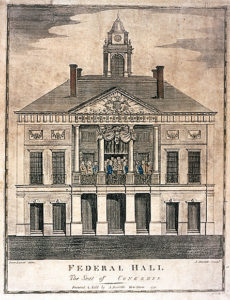
The story of what follows is told superbly by Vincent Phillip Muñoz in his article “The Original Meaning of the Free Exercise Clause: the Evidence from the First Congress,” Harvard Journal of Law & Public Policy 31, 3 (Summer, 2008), 1083-1120. Members of the First Congress explored freedom of religion and respect for conscience as they debated what would become the First and Second Amendments. In what follows, I cite the printed edition of the actual proceedings as published in 1834 by Gales and Seaton, vol. 1. If you wish to read these fascinating records, you can find them via the HathiTrust.

As Muñoz observes, the Free Exercise Clause was intended to allow people to choose whatever denomination or religion they wanted. Madison explained
“that Congress should not establish a religion, . . . nor compel men to worship God in any manner contrary to their conscience” (730mid).
It is nonetheless clear that only Protestant denominations were considered. Immediately after Madison’s speech, Benjamin Huntington of Connecticut hoped
“the amendment would be made in such a way as to secure the rights of conscience, and a free exercise of the rights of religion, but not to patronize [i.e. secure the rights of] those who professed no religion at all” (730-1).
Although conscience is mentioned in opposition to establishment, it was considered most seriously, not in the context of the First Amendment, but the Second, having to do with the militia. We should remember that among the Anti-Federalists’ greatest hesitations in agreeing to form a federal government was the possibility that it might maintain a standing army capable of overpowering the states. To win over doubters, the Federalists promised to allow each state to form its own militia and to oblige its citizens to serve in it. In addition to guaranteeing the individual states their own militias, Madison’s draft also acknowledged the pacifist convictions of Quakers:
“[N]o person religiously scrupulous of bearing arms shall be compelled to render military service in person” (434bot).
The words “in person” are crucial.
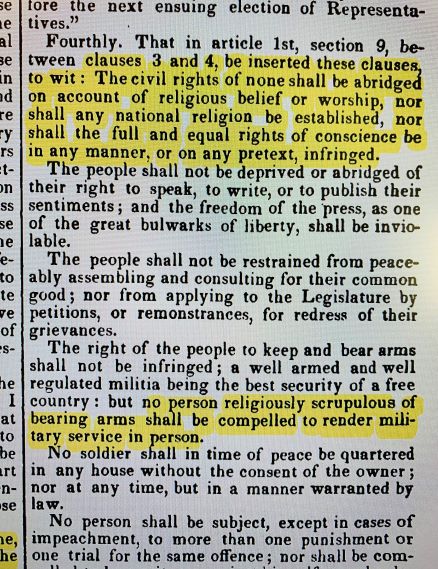
In the debate that addressed this question on August 17, three considerations arose. 1. Granting objectors an exemption from military service might tend to establish religion because it would induce others to become Quaker. 2. Such people would make bad soldiers. 3. Such a provision would deplete the militia’s ranks. James Jackson of Georgia proposed an answer: If “no person religiously scrupulous shall be compelled to bear arms,” he must procure a substitute (750bot).
Having served in the Revolutionary War and opposing conscientious objection, Jackson’s suggestion deliberately introduced a wrinkle to make the Quaker exception more onerous. Certainly, there was the task of finding a substitute, but there was also a moral complication. Even if the conscientious objector did not serve in person, by paying a replacement, he would nonetheless be complicit in war. A few members objected to this callousness. Roger Sherman of Connecticut explained:
“Those who are religiously scrupulous of bearing arms, are equally scrupulous of getting substitutes or paying an equivalent. Many of them would rather die than do either one or the other” (750bot).
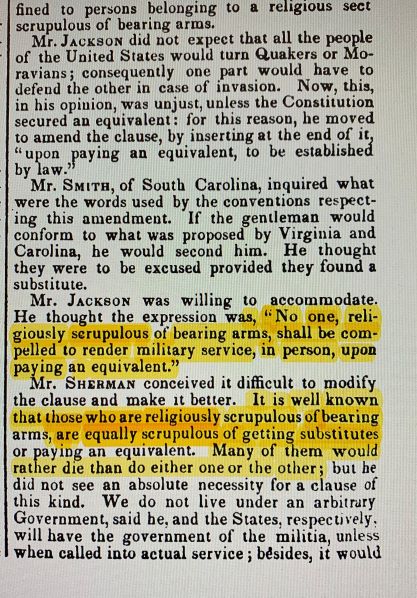
John Vining of Delaware agreed.
“To compel a man to find a substitute [is] the same as if the person himself turned out to fight” (751top).
Elias Boudinot of New Jersey approved Madison’s formulation but omitted the words “in person” (749bot). In total opposition, New York’s Egbert Benson objected to granting any exemption on grounds of conscience:
“No man can claim this indulgence of right. It may be a religious persuasion, but it is no natural right, and therefore ought to be left to the discretion of the Government” (751mid).
Benson presumably meant that, since refusal to serve in the militia on the basis of conscientious objection was not a natural right, it did not inhere in the individual, and therefore the government had the power to compel citizens to fight in the militia against their conscience.
In fact, neither our present First or Second Amendment mentions conscience. Except for a tiny minority, our Founders did not see an issue in the idea of complicity. During the Civil War, once the Confederacy and the Union introduced conscription, both sides allowed a person to pay a replacement. We now understand how paying substitutes exacerbates inequities of wealth. It does not protect conscience. The idea of complicity is, however, crucial and it recurs in our twenty-first-century debates about the Free Exercise clause.
* * *
The problem I have in dealing with claims of conscience that I don’t agree with is that I strongly sympathize with conscientious claims to exemption from military service. The question then becomes: How can you defend some claims of conscience and deny others? In my opinion, religious freedom does not give some the right to prohibit in others what they deny themselves. Our country has already rejected this tendency. Civil law no longer forbids conducting business on the sabbath. Prohibition has come and gone. You deny yourself alcohol. By what right do you deny it to me? The same logic applies to same-sex marriage, abortion, and many other things. Congress cannot allow some to say, “You should not do what offends my conscience.” Congress is obligated to “insure domestic tranquility” not uniformity of belief and certainly not conformity in religion. The founders sought “to promote the general welfare,” and preserve “the public peace.” Only tolerance of differing conscientious convictions will bring about this goal.
What our review of the First Congress shows is that the religious right invents religious rights by devising a novel prominence for complicity that it did not have for the Founders. One might legitimately ask, however: If the First Amendment guarantees “the free exercise of religion” why not rely on complicity to expand religious freedom? Help with this question comes from an article by Mark Storslee, Executive Director of the Constitutional Law Center at Stanford University. “Religious Accommodation, the Establishment Clause, and Third-Party Harm,” The University of Chicago Law Review 86, 4 (June, 2019), 871-944. To illustrate the issue, Storslee examines the debate within the First Congress over conscientious objection to military service — precisely the issue that most interests me. The dilemma is this. A military force requires a number of combatants, and every conscientious objector reduces that number by one. So, on the one hand, there is the harm done to others when one person asserts conscience for an exemption from the law. On the other hand, there is the risk that recognizing the conscientious objection might have great appeal and thereby establish the religious precepts behind the exemption.
Turning to the Founders, Storslee quotes Georgia’s Revolutionary War veteran James Jackson reiterating in the second session of Congress what he had already asserted the year before.
“[T]he operation of this privilege would be to make the whole community turn Quakers; and in this way it would establish the religion of that denomination more effectually than any positive law could [or] any persuasion whatever” (2 Annals of Congress p. 1869 bot, Dec 22, 1790, cited by Storslee, p. 912).
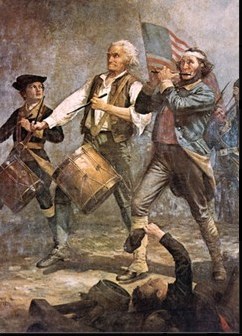 Fife and Drum
Fife and Drum
Storslee therefore contrasts harm and establishment. The same opposition structures Burwell v. Hobby Lobby. The case arose in reaction to Barack Obama’s Affordable Care Act (ACA) which defined the type of insurance employers must offer their employees and imposed a penalty on those who refused. Therefore, the Green family, owners of Hobby Lobby Stores, a closely held corporation, risked significant monetary penalties when they claimed that their Christian faith prevented them from offering the required insurance whose coverage included abortifacients and abortions. The Greens refused to become complicit (as they saw it) in those medical interventions. Justice Samuel Alito, who wrote for the Court’s majority, prioritized the financial harm to the firm. In her dissent, Justice Ruth Bader Ginsburg stressed harm to the firm’s female employees who might be denied this medical care.
Following Storslee’s lead, we can propose two tests of any proposed exemption: harm versus establishment.
(1.) The harm test. Does forcing employers to pay for medications (contraceptives) or medical procedures (abortions) they find morally objectionable harm the enterprise or the economy as a whole? If so, how much? Then, compare that harm to what would be suffered by the employees denied medications or medical procedures if the employers were to be accommodated. Instead of focusing on the employer’s conscience, this approach considers the enterprise, employer and employees, as a whole. Accommodating the employers’ conscience disadvantages their employees by denying them important services and by providing less protection than what is given to workers at comparable businesses where no exception is granted.
(2.) The establishment test. Exempting employers from insuring certain medical needs would encourage religions that prohibit that practice and violate the establishment clause.
* * *
Many claim that denial of exemptions like those allowed in Hobby Lobby privileges all beliefs except the religion of the employer and effectively establishes secularism. The answer to that argument lies in the the Supreme Court Decisions Owen (1969), Welsh (1970), and Gillette (1971) that grew out of the widespread resistance to the war in Vietnam. The turning point occurs in Welsh. In 1966, Elliott Welsh II sought conscientious objector status under the draft laws of that time. Dating from 1948, The Universal Military Training and Service Act’s section 6(j) states:
Nothing contained in this title shall be construed to require any person to be subject to combatant training and service in the armed forces of the United States who, by reason of religious training and belief, is conscientiously opposed to participation in war in any form. Religious training and belief in this connection means an individual’s belief in a relation to a Supreme Being involving duties superior to those arising from any human relation, but does not include essentially political, sociological, or philosophical views or a merely personal moral code (as quoted in Welsh).
 The broken rifle symbol of War Resisters International
The broken rifle symbol of War Resisters International
When Welsh refused to say that his objection to war was based on any “relationship to a Supreme Being” or on his “religious training and belief,” his draft board denied his application and sentenced him to three years in prison. His appeal reached the Supreme Court, and the majority decided for him. The concurring Justice John Marshall Harlan II quoted section (6)j and repudiated its distinction between religious and philosophical reasons for conscientious objection.
[This language] not only accords a preference to the ‘religious’ but also disadvantages adherents of religions that do not worship a Supreme Being. . . . This in my view offends the Establishment Clause.
Further:
If the exemption [i.e. Conscientious Objector status] is to be given application, it must encompass the class of individuals it purports to exclude, those whose beliefs emanate from a purely moral, ethical, or philosophical source.
He concludes:
Since this [refusal of CO status] created a religious benefit not accorded to petitioner [Welsh], it is clear to me that this conviction must be reversed under the Establishment Clause of the First Amendment.
It is interesting that, in reaching his decision, Harlan also cited cases that go in the opposite direction, which
all sustained legislation on the premise that it was neutral in its application and thus did not constitute an establishment, notwithstanding the fact that it may have assisted religious groups by giving them the same benefits accorded to nonreligious groups.
For Harlan, the standard for such decisions had to be equal treatment for religious and nonreligious groups.
 The Peace Symbol designed by Gerald Holtom, London, 1958
The Peace Symbol designed by Gerald Holtom, London, 1958
The official summary of the Court’s decision (called “the syllabus”) highlights Harlan’s reasoning and states:
Section 6(j) contravenes the Establishment Clause of the First Amendment by exempting those whose conscientious objection claims are founded on a theistic belief, while not exempting those whose claims are based on a secular belief. To comport with that clause, an exemption must be ‘neutral’ and include those whose belief emanates from a purely moral, ethical, or philosophical source.
“Neutral,” therefore, is the key word in this debate, and I believe it is at the core of the RFRA’s quotation marks around the word and its intimation that neutrality in legislation about religion is often feigned. In fact, RFRA reverses the trend so dramatically emphasized in Welsh. The Vietnam War-era Supreme Court’s decisions acknowledge that conscience can exist independently of religion. In order to avoid undue establishment, secularism, a mindset and code of conduct composed of “purely moral, ethical or philosophical” convictions, must be granted legal parity with religion.
* * *
In order to reduce the tension between these competing claims the first requirement is to increase good will throughout our community, the United States of America. The Free Exercise Clause allows you to deny yourself actions your religion prohibits, but the Establishment Clause prevents you from imposing that on me. For example, if you claim that paying taxes (or insurance premiums) to fund my abortion makes you complicit in abortion, I answer that the tax exemption granted to your place of worship and its associated school makes me complicit in your propagating doctrines I consider false and behavioral restrictions that inhibit freedom. Seen from the angle of either clause, the violation of another person’s rights perpetrates harm. Abridging the legally exercised liberty of your neighbor is always wrong.
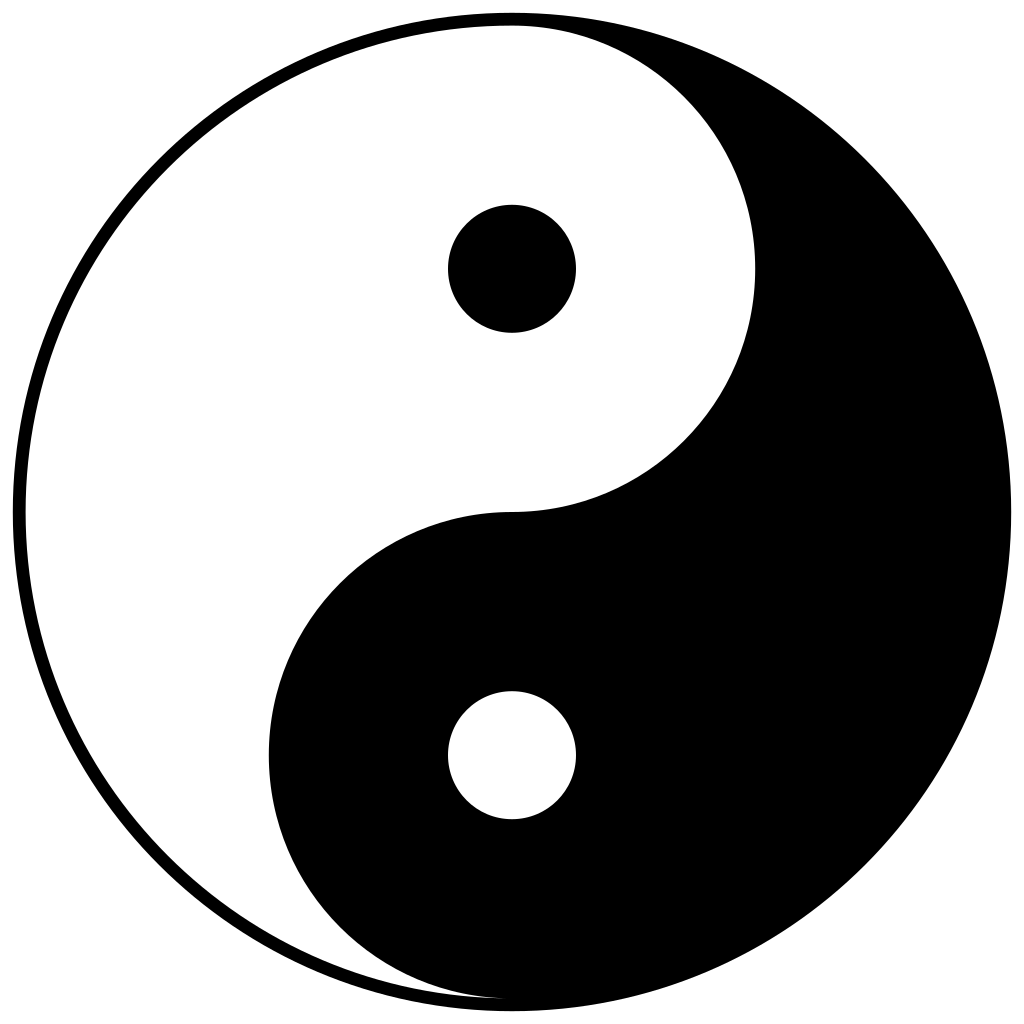 Yin-Yang symbol. The complementarity of all things.
Yin-Yang symbol. The complementarity of all things.
This principle was soundly established from the very beginning of our country. In a 2016 article, the same Vincent Muñoz cited above quotes from the constitutions of the individual states before the ratification of the U. S. Constitution. (“The Inalienable Rights of Religious Liberty,” Notre Dame Law Review 91:4 [2016], 1387-1417.) He finds many passages guaranteeing these kinds of protection against harm to others. He quotes a Delaware provision of 1776 to the effect that
“[N]o Man ought or of Right can be compelled to attend any religious Worship [i.e. religious service] . . . contrary to or against his own free Will and consent (1406).
Some state constitutions asserted a universal duty to worship God. Benjamin Huntington opposed “those who professed no religion at all.” But, generally, the founders considered variety in belief and style of worship less important than community coherence. As Massachusetts put it, each man is allowed to worship according to his own conscience “provided . . . he doth not disturb the public peace, or obstruct others in their religious worship” (1394, 1414). New Hampshire used similar language (1405). Muñoz concludes, “the Founders held religious freedom to protect both believers and non-believers” (1408). Or again, “The Founders understood natural rights [such as freedom of conscience] to have natural limits. An individual’s exercise of his natural rights does not extend to interference with other individuals’ natural rights” (1416).
This lack of interference in another’s rights (called freedom) was therefore a driving premise of the Founders and those who drafted the Bill of Rights. In modern times, as we have seen, the Selective Service decisions such as Welsh gave “moral, ethical, or philosophical” beliefs equal force with religion. If these secular reasonings can be used on a par with Quakers’ status in seeking conscientious objection to military service, the parity of moral philosophy with religion is firm. To deny that parity is to establish religion. Although the First Congress sought primarily to avoid imposing any one Protestant denomination on the whole country, the Vietnam War-era decisions are entirely consistent with the statement by Madison I quoted above:
“Congress should not establish a religion, . . . nor compel men to worship God in any manner contrary to their conscience.”
Reason and faith, secularism and religion are now legally equal. The free exercise of religion inheres in all moral scruples, and the Establishment clause prevents any one person’s scruples from harming another.
IN CONCLUSION: The Founders considered but then excluded all mention of conscience and complicity from the Bill of Rights. Therefore the religious right invents religious rights when it exaggerates religious precepts and understates the danger of establishment and harm to third parties. Rights claimed to protect the conscience as understood in RFRA without equal regard to Welsh violate the First Amendment’s constitutional parity between religious and philosophical convictions. RFRA itself and cases like Hobby Lobby ignore the neutrality (without quotation marks) between religious and secular reasoning stipulated in the First Amendment and reaffirmed through attention to conscience during the war in Vietnam. We must defend those advances.

Dove of Peace
Many thanks to JoAnne Bernstein, Jonathan Beck, and Marcella Calabi for helping me think my way through this essay. For the peace symbols, see https://www.thehistorypress.co.uk/articles/peace-symbols-through-history/ and https://spiritualray.com/signs-symbols-of-peace.